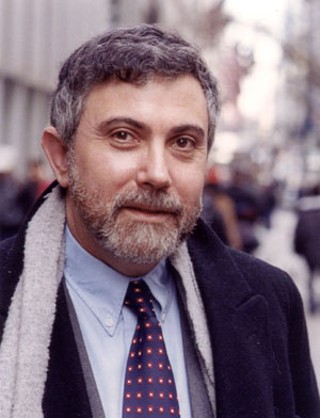License to Shrill, Uncensored
Paul Krugman on America's New Gilded Age
By Wells Dunbar, Fri., Nov. 9, 2007

Now "98.7% recovered" from an intense bout with the flu, economist Paul Krugman claims he was "really barely rational" last week. Sorry to disagree, but Krugman doesn't do irrational. Since joining The New York Times op-ed page in 2000, the Princeton professor has documented the failings of the Bush administration with intense academic rigor. His new book, The Conscience of a Liberal, examines the impact of economic and political polarization under Republican rule and calls for Democrats to push back against what he calls America's "new Gilded Age." In the midst of his 20-city book tour, we spoke with Krugman in advance of his Nov. 13 appearance at the University of Texas. What follows is an unabridged transcript of our conversation.
Austin Chronicle: I wanted to begin by stating what the major themes of The Conscience of a Liberal seem to be and then let you expand on that or correct me. You're arguing that economic equality and moderate politics go hand in hand and that a broad postwar middle class was matched by relatively centrist politics.
Paul Krugman: That's exactly right.
AC: Then in the Seventies or so, movement conservatism, mainly funded by the rich, began attempting to roll back the New Deal reforms that created the middle class; to do so effectively, they've had to crassly appeal to the "base." You make the argument this has been primarily done through race-baiting politics, the Southern strategy of the Republican Party.
PK: Yeah. There are other things, but that's the dominant one. What [party] management is interested in is economics, but you win elections by appealing to race, moral values, and national security – but mainly race.
AC: Why do you see this emphasis on races? There are other red-meat issues, the three Gs – God, gays, and guns – plus abortion, things like that. Why race?
PK: Well, all of those have been used, but if you look at the voting data, race appears to be the thing that mattered the most by far. I'm very strongly influenced by work like that of Larry Bartels at Princeton, where he looks at the [What's the Matter With Kansas? author] Tom Frank hypothesis that it really is about abortion and moral values and says, 'You know, that doesn't really seem to be what happens in the data.' There's a statistic that isn't in the book but is implied. We all know that white men have left the Democratic Party, and they've done so because of God, gays, and guns, moral values, all that. And what we all know isn't true. Because once you take the South out of the picture, take the Southern switch outta the picture, it just didn't happen. In 1952, 40% of white males outside the South voted Democratic. In 2004, 39% of white males outside the South voted Democratic. The great turning away of working class white voters that supposedly happened actually didn't happen outside the South. It's a purely post-civil rights success of Nixon's Southern strategy, and there isn't much left over to explain. Which is not to say it hasn't made some difference, especially in close races; no one would deny that the mobilizing of evangelicals in Ohio in 2004 might have tipped the balance, but it's not a really large segment. The only thing that's a really huge change in voting behavior comes from basically mobilizing white voters in backlash against civil rights.
AC: So, following that strategy outside of the South, do Republicans seem doomed to go over the cliff with changing demographics?
PK: Well that['s] what it looks like to me; the book, from a liberal's point of view, is very optimistic at the end. I look at the demographics, and the evidence is pretty clear now the GOP has not been able to reach out to Latinos and Asians. And because we are a less white country, that's a bad thing from the point of view of the Southern strategy. The other thing is values have changed. Overt racism is now unacceptable. "Macaca" was really the defining moment of 2006; not because of the racist epithet – those we've had forever – but because even in Virginia, that won't play anymore.
AC: Returning to the economic themes of the book, you say most people think of the postwar middle class as created by "impersonal forces, like technological change and globalization." But you argue they were policy creations of the New Deal and the currently shrinking middle class is an outgrowth of Republican policy.
PK: Yeah, not to deny there are impersonal market forces out there, but the creation of middle-class America is very clear cut. The great compression [from the Gilded Age to a large middle class] is something that happened because Franklin Roosevelt and the New Deal wanted it to happen. It happened in a very short period of time through political action – and persisted. The two great lessons of the great compression are, first, that you can do a lot to affect income distribution through changes and political priorities, and second, those changes can last for a long time. You had 30 years of middle-class America following those actions. There's a fair bit of evidence politics has played a big role in widening income disparities. A lot of that comes from international comparisons, noticing that the United States looks so very different from other advanced countries. If it was all technology and globalization, this unequalizing trend should be something we see everywhere, but in the West, only America has entered a second Gilded Age.
AC: You write at first you assumed polarizing politics were an outgrowth of polarizing economics and inequality, but over the course of writing this book, your opinion shifted: Politics cause economic polarization.
PK: I came in with the view that we tend to think of income distribution as being supply and demand and, therefore, really outside the reach of policy. But there's also the timing. If you look at the rise of movement conservatism, the sharp rightward shift of the Republican Party, that comes in the early Seventies. You don't start to see the big increase in inequality until the 1980s. Everything points to the reality that politics has been leading economics, not the other way around.
AC: There's this reverence for the market as this great unbiased voice ... is this some form of economic heresy to say no, it's not that indifferent?
PK: Well, I'm a card-carrying economist myself. But what's interesting, if you look at the people who've done the most work on tracing out these long-term changes in income distribution, everyone who spends a lot of time looking at the long sweep comes to the conclusion that norms and institutions are a lot more important than what your Econ 101 textbook would say.
AC: Without getting too wonkish, is that a trend in economics, a recognition of real political and institutional forces?
PK: A lot of economics has been adding to – adding to is the right word – the paradigm that economics is two lines crossing and that determines everything, one upwards sloping, one downward sloping. And there's a growing sense there are different ways things can be organized, that they can be moved quite a lot by a change in the political environment.
AC: One big change would be what you conclude the book with, a call to expand the social safety net by providing universal health care. What do you think of the Democratic candidates' plans, and correct me if I'm wrong, but isn't Kucinich's plan the only public health-care plan, while the other ones rely on private providers?
PK: That's not exactly right. Kucinich is the only one who's calling for single-payer now. But all the plans of the three leading contenders – Edwards, Obama, and Clinton – they allow people to retain private insurance, but they also offer the opportunity of buying into a publicly run plan. And in fact, the Edwards plan is quite explicit; they say, "This might evolve into a single-payer system." They all start out with a structure which looks something like what Massachusetts now has or what Schwarzenegger is trying to get in California, but they contain this crucial additional element, which is public/private competition, including a public plan which would essentially allow people to buy into Medicare. And that makes a big difference in my point of view. So yeah, if I was in a world without political considerations, there would be a pretty good case for saying, let's have Medicare for everybody. But the plans out there are pretty good, actually a reasonable compromise and transition plan which I'm actually quite approving of. Only deep wonks can even discern the differences among the leading Democratic plans. They're basically a single major plan.
AC: So they'd all be pretty great steps forward?
PK: Yeah, I would be wildly enthusiastic if we got any of those plans implemented.
AC: In one of your recent columns, ostensibly about Clinton, you wrote that a lot of liberals and progressives may be hoping for another FDR, but "we worry that he or she will turn out to be another Grover Cleveland instead – better-intentioned and much more competent than the current occupant of the White House, but too dependent on lobbyists' money to seriously confront the excesses of our new Gilded Age." That was a very eloquent and provocative statement.
PK: Well, here's what we have. Corporate money is now heavily going towards Democrats. There are a couple reasons for that: One is that the Republicans were running a sorta protection racket against the corporations, and they're glad to be out of it. But also, they're betting on who they think is going to win, and this does raise a question. Aside from the oil and gas industry, every industry is either splitting its donations evenly, or giving heavily to Democrats. Presumably, they think they're buying influence with it. On the crucial issues of taxation and health-care reform, what the industries would hope to buy is, basically, a watering-down of reform. What they would like to get is a health-care plan that doesn't actually regulate the insurance companies as much as is necessary and maybe does not have effective public competitions – which would do a lot to undermine the quality of the plan. There's no way of knowing what they will get. It's clear that there's a progressive movement, more or less cohesive now, that would scream bloody murder if there is an effective betrayal here. You could just imagine. [Service Employees International Union President] Andy Stern and the service workers have made a real push, together with various groups. People, including me, have basically chivvied the Democrats into coming up with these health-care plans; they would protest ferociously if a Democrat president doesn't deliver. But it's still a real risk. What we're all worried about is, basically, all this progressive energy will be dissipated in triangulation.
AC: Obviously Clinton gets the most flak for being a triangulator. It's more widespread than her, but is it fair to think of her as the worst offender?
PK: Well, she's the one that's getting a lot of the corporate money. That could be just because of her frontrunner status. It could be because the corporations are deluding themselves in thinking they can get her to go easy on them. But it's an obvious concern. The truth is we don't know. No one has much suspicion that Edwards is in the pocket of corporate PACs because he isn't getting much money from them, so that's a big difference. It's a concern. I'm certainly not a Naderite who believes that a Democrat that gets corporate money is indistinguishable from the Republicans, right? One thing we've learned is there's a difference between being disappointed and having madmen in authority. It's not all the same, but it's a very, very real concern and certainly something people should take into account when forming their preferences.
AC: What do you make of the Democratic frontrunners' statements on Iraq and getting the hell out of there – or not?
PK: I think that's triangulation on all parts. I'm a little cynical here. I actually don't think any Democrat would keep us in Iraq for years to come. But I do think they're all looking and saying, "Well, we have an overwhelming advantage over the Republicans on every issue but national security" – that's the one that's more or less even – "so why take risks? Let's just play it vague on the security issues and win the election on health care." I don't think that's actually very wise on their parts, but it is, I think, what's going on.
AC: Seems like the same failed strategy that got them swept out in '02.
PK: Yeah, you would think that we would learn not to be Dick Gephardt. [Laughs]
AC: You would think. It's interesting to see what's happening with Chris Dodd's candidacy, almost taking a cue from the blogosphere with a staunch defense of constitutional rights, leading on [opposing the Mukasey nomination] and against telecom amnesty [for the companies' compliance in breaking wiretap laws]. Is he helping the field by bringing these issues up?
PK: I think so. There's been a dynamic, certainly, where the less-favored candidates have been willing to take more risks, the bigger candidates look at it and say, "Gee, look at the response, lightning did not rain down from heaven on them." Health care worked that way. Edwards, clearly, of the leading three, had the lowest probability of actually getting the nomination. So he went out and had a terrific health-care plan in February that was much more ambitious than anyone was prepared to contemplate before then, I think. It turned out the response was overwhelmingly favorable, and now we have that plan echoed by Obama and Clinton. That's a useful role. If this nomination had been sewn up right from the beginning, I think we probably wouldn't be having people stepping forward this much.
AC: I'd like to talk about you and your role at the Times and as a pundit in general. When you got a bad review in the Times book review, you noted it was your second, and somewhat of a tradition. You were spuriously attacked by the outgoing Times ombudsman, and you've also been subject to attacks from so-called centrist types and Dem hawks. Then there's all the accusations of being "shrill." To what do you ascribe these institutional attacks?
PK: I think a lot of this comes from people who are, you might say, embarrassed at not having spoke up about what was going on earlier. There's a broader syndrome, not so much personal, where the liberal hawks that are for the war are constantly trying to denigrate the people that got it right. There's a clear element of, I might say, a guilty conscience in all that. And I think there's some of that going on here. By the way, The New York Review of Books review just came out. It's very different; it's not the same book being described. You know Brad DeLong, the blogger and Berkley economist, and a friend, has actually created the Ancient and Hermetic Order of the Shrill [the Shrillblog at www.shrillblog.blogspot.com], because people are always calling me shrill. It is funny. You're considered unreliable and unsound on national security unless you were wrong about Iraq. You're considered shrill and unreliable on politics unless you waited until about 2005 to notice Bush was a really bad president. It's a very peculiar situation. So I'm unreliable, because I actually noticed very early what these people were up to.
AC: Whereas Charles Krauthammer and every other neocon is still blathering away on Fox News about Iran, even though they were completely wrong about Iraq.
PK: And there's another very funny thing, which is, I think, people in the press have somehow not quite absorbed the reality that just because there are lots and lots of people claiming that you're wrong, that doesn't mean there's actually anything there, just that there's a pretty organized campaign out there. But sure. We know that during World War II there was a category of people who were regarded as unreliable, as premature anti-fascists. I'm not saying that Bush is a fascist [laughs], but it's that same kind of thing.
AC: Do you think the accusations of shrillness in part result from your economics training, that not being taught as a D.C. journalist, you don't respect these unwritten niceties of the Beltway? You were the first to call out the Bush tax cuts scheme and basically call a spade a spade in several instances.
PK: I'm not so sure it's the economics training, although I like to say I did notice the administration's dishonesty early because I know some things that most journalists don't, like arithmetic. I think it's more that this is not my sole career; I'm not interested in keeping myself as a long-term insider in the Beltway, so I probably was just willing to say the obvious sooner than most people.
AC: Do you think that's part of the reason for your fan base in the blogosphere?
PK: Well yeah, but I also hope I'm supplying useful stuff. I like to think I've done a lot of real constructive provision of facts and arguments on health care; I like to think I played a significant role on [the Social Security debate]. There's actually a lot of homework behind my columns, and behind Conscience of a Liberal, too. In some ways, I think I probably do more factual research than most people in the commentariat.
AC: Why The Conscience of a Liberal? Why the same title as Paul Wellstone's book?
PK: This is a little embarrassing. Although of course I knew about the book, it somehow fell through the cracks of my head when coming up with the title. I had not meant to echo Paul Wellstone; what I meant was to echo Barry Goldwater. Not out of admiration for Goldwater's book [The Conscience of a Conservative], but out of hope that just as his book signaled the beginning of a great turn in American politics, this one might do the same. So that's the allusion that's intended.
Paul Krugman speaks Tuesday, Nov. 13, at 7pm at the University of Texas' University Teaching Center, 2.102-A (21st Street at University Avenue). Please arrive early to get a seat.
Got something to say on the subject? Send a letter to the editor.










